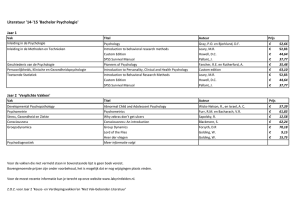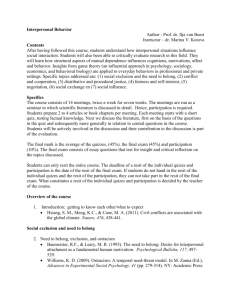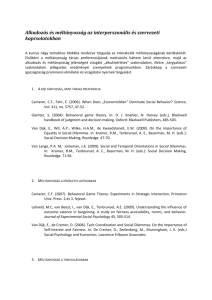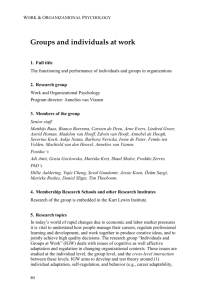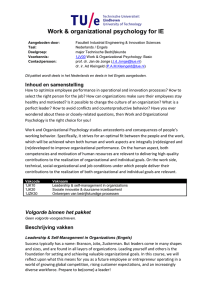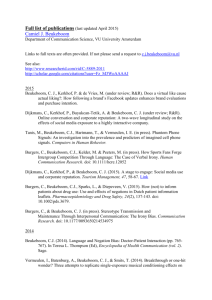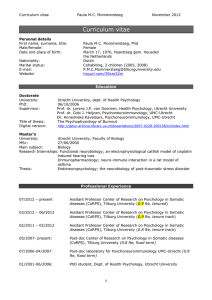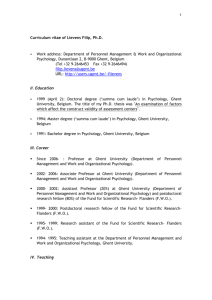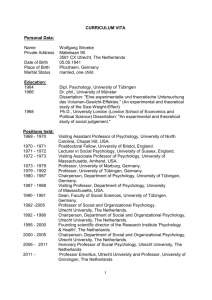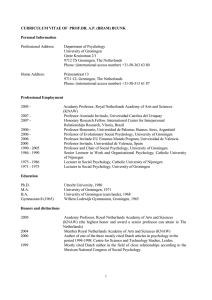dhr. prof. dr. C.K.W. (Carsten) de Dreu
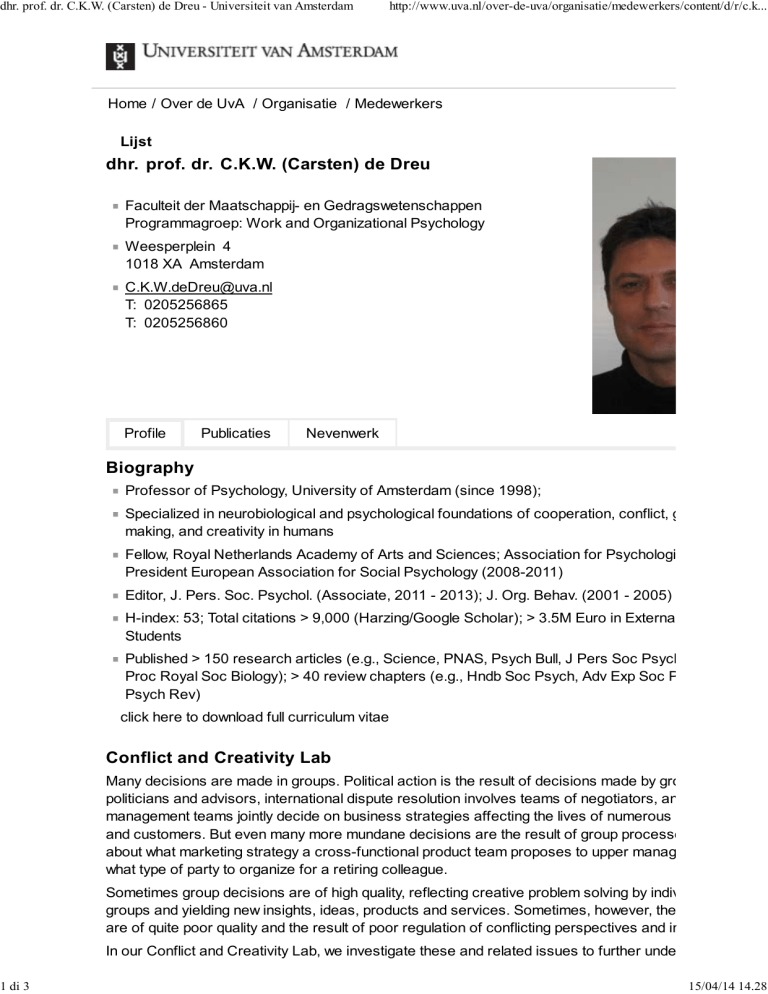
dhr. prof. dr. C.K.W. (Carsten) de Dreu - Universiteit van Amsterdam http://www.uva.nl/over-de-uva/organisatie/medewerkers/content/d/r/c.k...
Home / Over de UvA / Organisatie / Medewerkers
Lijst
dhr. prof. dr. C.K.W. (Carsten) de Dreu
Faculteit der Maatschappij- en Gedragswetenschappen
Programmagroep: Work and Organizational Psychology
Weesperplein 4
1018 XA Amsterdam
C.K.W.deDreu@uva.nl
T: 0205256865
T: 0205256860
1 di 3
Profile Publicaties Nevenwerk
Biography
Professor of Psychology, University of Amsterdam (since 1998);
Specialized in neurobiological and psychological foundations of cooperation, conflict, g making, and creativity in humans
Fellow, Royal Netherlands Academy of Arts and Sciences; Association for Psychologi
President European Association for Social Psychology (2008-2011)
Editor, J. Pers. Soc. Psychol. (Associate, 2011 - 2013); J. Org. Behav. (2001 - 2005)
H-index: 53; Total citations > 9,000 (Harzing/Google Scholar); > 3.5M Euro in Externa
Students
Published > 150 research articles (e.g., Science, PNAS, Psych Bull, J Pers Soc Psych
Proc Royal Soc Biology); > 40 review chapters (e.g., Hndb Soc Psych, Adv Exp Soc P
Psych Rev) click here to download full curriculum vitae
Conflict and Creativity Lab
Many decisions are made in groups. Political action is the result of decisions made by gro politicians and advisors, international dispute resolution involves teams of negotiators, an management teams jointly decide on business strategies affecting the lives of numerous and customers. But even many more mundane decisions are the result of group processe about what marketing strategy a cross-functional product team proposes to upper manag what type of party to organize for a retiring colleague.
Sometimes group decisions are of high quality, reflecting creative problem solving by indiv groups and yielding new insights, ideas, products and services. Sometimes, however, the are of quite poor quality and the result of poor regulation of conflicting perspectives and in
In our Conflict and Creativity Lab, we investigate these and related issues to further unde
15/04/14 14.28
dhr. prof. dr. C.K.W. (Carsten) de Dreu - Universiteit van Amsterdam http://www.uva.nl/over-de-uva/organisatie/medewerkers/content/d/r/c.k...
neurobiological, psychological, and social-contextual antecedents and consequences of d made by individuals and groups.
We develop and use game-experimental models of group decision making, including so-c information-pooling paradigms and bargaining games of trust, cooperation and competitio a variety of well-established tasks to gauge creative cognition.
We measure not only behavioral tendencies and human performance, but also psycholog neurophysiological variables that enable us to understand why individuals and their groups achieve creative solutions, regulate conflict of interest, and integrate diverse perspective quality judgments and decisions.
Recent Work on Neurobiology of Cooperation
The neuropeptide oxytocin regulates parochial altruism in intergroup conflict among hu
2010).
Oxytocin promotes human ethnocentrism, Proceedings National Academy of Science
Oxytocin modulates selection of allies in intergroup conflict . Proceedings of the Roya
B-Biological Sciences (2012)
Recent Work on Psychology of Creativity
Motivated information processing, epistemic social tuning, and group creativity. Journa and Social Psychology (2010).
When prevention promotes creativity: The role of mood, regulatory focus and regulato of Personality and Social Psychology (2011)
The cognitive cost and functionality of creativity under approach vs. avoidance motivat
Personality and Social Psychology (2012)
Working Memory benefits creative insight, musical improvisation and original ideation t task-focused attention. Personality and Social Psychology Bulletin (2012).
Recent Work on Conflict and Group Decision Making
Now you see it, now you don't: Interests, issues, and psychological distance in integrat
Journal of Personality and Social Psychology (2010).
Social value orientation moderates in-group love but not out-group hate in competitive
Group Processes and Intergroup Relations (2010)
In competitive interaction displays of red increase actors' competitive approach and pe withdrawal. Journal of Experimental Social Psychology (2012)
Interest (mis)alignments in representative negotiations: Do pro-social agents fuel or re conflict? Organizational Behavior and Human Decision Processes (2012)
Media Coverage (in Dutch)
Climate Gate en Tunnelvisie in de Wetenschap
Artsen Straffen Helpt Niet: NRC May 2007
Sociale Verbindingen (Idee66; 2010)
Liever Polderen dan Polariseren
Blije Bedrijven: NRC 2009
Illusie van de Zelfzucht: Groene Amsterdammer 2009
2 di 3 15/04/14 14.28
dhr. prof. dr. C.K.W. (Carsten) de Dreu - Universiteit van Amsterdam
Besluitvorming NZ-lijn; Het Parool 2010 http://www.uva.nl/over-de-uva/organisatie/medewerkers/content/d/r/c.k...
Denkfouten over Diversiteit inOrganisaties
Past and Present PhD Students
Ernestine Gordijn (1998)
Ellen Giebels (1999)
Fieke Harinck (2001)
Bianca Beersma (2002)
Marjolein de Best (2004)
Gerben van Kleef (2004)
Wolfgang Steinel (2004)
Maria Dijkstra (2006)
Irene de Pater (2005)
Eric Rietzschel (2005)
Astrid Homan(2006)
Lotte Scholten (2007)
Femke ten Velden (2008)
Mauro Giacomantonio (2009)
Matthijs Baas (2010)
Ilona McNeill (2011)
Shaul Shalvi (2011)
Marieke Roskes
Daniel Sligte
3 di 3 15/04/14 14.28
